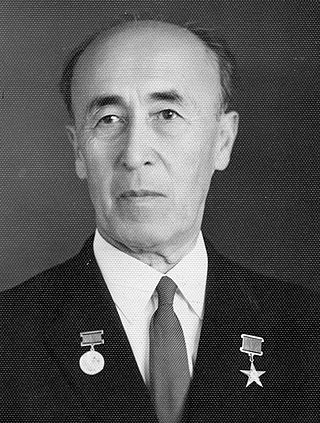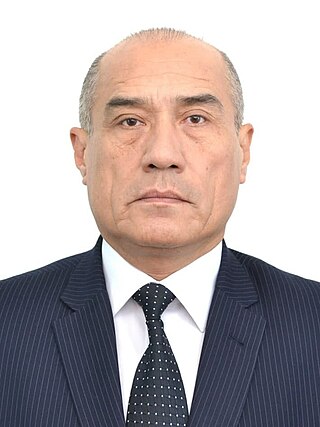
Moscow State University is a public research university in Moscow, Russia.

Viktor Antonovich Sadovnichiy is a Russian mathematician, winner of the 1989 USSR State Prize, and since 1992 the rector of Moscow State University. One of the main opinion leaders in Russia, Sadovnichiy has significant political and social influence.

Diplomatic relations between Belarus and Uzbekistan were established on 21 January 1993, with the Belarusian Embassy in Tashkent being opened in February 1994. Uzbekistan also has an embassy in Minsk.

Zulfiya Isroilova, known by her pen name Zulfiya was a Soviet and Uzbek writer. She repeatedly was a leader or chief editor for various media, participating in Soviet delegations to various conferences. The Uzbek National Award for Women was created and named after her.

The Museum of Arts of Uzbekistan is the largest state art museum in Uzbekistan. Its permanent collection contains more than several thousands works, divided among four curatorial departments. The museum was established in 1918 as a Museum of People University and renamed as a Central Arts Museum later. It was named as Tashkent Art Museum in 1924 and finally Museum of Arts of Uzbekistan in 1935.

Tashkent State Technical University (TSTU) is one of the oldest universities in Uzbekistan. Currently, the university consists of 6 faculties, and prepares highly skilled professionals in technical and engineering fields. For this year, it is estimated to run 56 departments with over 10 746 students, who are taught by 6 academicians of the Academy of Sciences of Uzbekistan, 74 doctors of sciences and 314 candidates of sciences.

Aleksandr Vasilievich Nikolayev, also known as Usto Mumin, was a Soviet painter of Russian origin, who lived and worked in the Uzbek SSR.
Nazokat Anvarovna Kasimova is an Uzbek political scientist, Doctor of Political Science, professor, a leading expert of Uzbekistan on international systems and political issues of global development, regional integration, and regional security, as well as a national expert on higher education reform in Uzbekistan.

The National Guard of the Republic of Uzbekistan is a uniformed independent formation within the Armed Forces of the Republic of Uzbekistan. The headquarters of the National Guard is based in Tashkent, where most of the 30,000 soldiers that make up the force are located. As of 2020, the individual in charge of the UNG is currently Rustam Jo'raev. He succeeded Colonel General Bakhodir Tashmatov and Botir Tursunov.

The Academy of the Armed Forces of Uzbekistan is a body for the training of highly qualified military personnel for the Armed Forces of the Republic of Uzbekistan. It was originally established as an inter-service educational institution that serves the purpose of training officers for higher level leadership positions. Cadets who study at the academy are enrolled for at least 2 years. It was the first institution of its kind to be established on the militaries of Central Asia. The school requires all cadets to be fluent in the Uzbek language as well as have a basic knowledge of Russian.

The Shenzhen MSU–BIT University (SMBU) is a university in Longgang, Shenzhen, Guangdong, China. It is established in 2016 as a joint venture between the Beijing Institute of Technology and Moscow State University with funding support from Shenzhen Municipal Government.

Obid Sodiqovich Sodiqov was a Soviet Uzbek organic chemist, academician, and politician.

Turin Polytechnic University in Tashkent is a non-profit public higher education institution in Uzbekistan. Turin Polytechnic University in Tashkent was established in 2009 in a partnership with Politecnico di Torino, Italy. TTPU's main objective is to prepare specialists for the automotive, mechanical engineering, electrical industries and companies in the field of civil engineering and construction, and the power industry, in accordance with the educational programs adopted in collaboration with Politecnico di Torino, Italy.

Narzullo Naimovich Oblomuradov is an Uzbekistani politician and scientist who is serving as the leader of the Ecological Party of Uzbekistan since 1 February 2021. Since 30 December 2021, he is the Chairman of the State Committee of the Republic of Uzbekistan on Ecology and Environmental Protection. He was the Ecological Party's presidential candidate in 2021 presidential elections. He got 4.1%.

Toshmuhammad Qori-Niyoziy was an Uzbek mathematician and historian who served as the first president of the Academy of Sciences of the Uzbek SSR.

Shuhrat Sirojiddinov is a Doctor of Philology, professor, and a member of the Academy of Sciences of Uzbekistan — academician. He has been the Rector of Alisher Navo’i Tashkent State University of Uzbek Language and Literature since 2016.

Abdulla Aʼzamovich Aʼzamov is a Soviet and Uzbek doctor of physical and mathematical sciences (1987), professor, member of the Academy of Sciences of Uzbekistan (2013), president of the Uzbek Mathematical Society (2013), vice-president of TWMS (2017). He is the recipient of the "People's Education Hero" medal, the International Babur Award (2015), the "Order of Labor Glory" (2016) and the honorary title of "Scientist of the Republic of Uzbekistan".
Sergo Sutyagin was an Uzbek architect. He was a laureate of the State Prize of the Uzbek SSR named after Hamza in 1966, as well as the State Prize of the Republic of Uzbekistan in the field of literature, art, and architecture named after Alisher Navoi, along with other awards.
Galina Melnikova is an Uzbek television announcer. She has been working on television since 1956. For many years, she hosted the program "Ahborot", as well as ceremonial and festive events. She is a People's Artist of Uzbekistan.
Ilariya Alekseyevna Raykova was a scientist, biologist, geographer, explorer, and one of the leading botanists, educator, researcher-practitioner, Doctor of Biological Sciences (1944), Professor of the National University of Uzbekistan (1945), Honored Scientist of the Uzbek SSR (1945), Corresponding Member of the Academy of Sciences of the Uzbek SSR (1956), Honorary Member of the Russian Botanical Society and the Russian Geographical Society (1970).

















